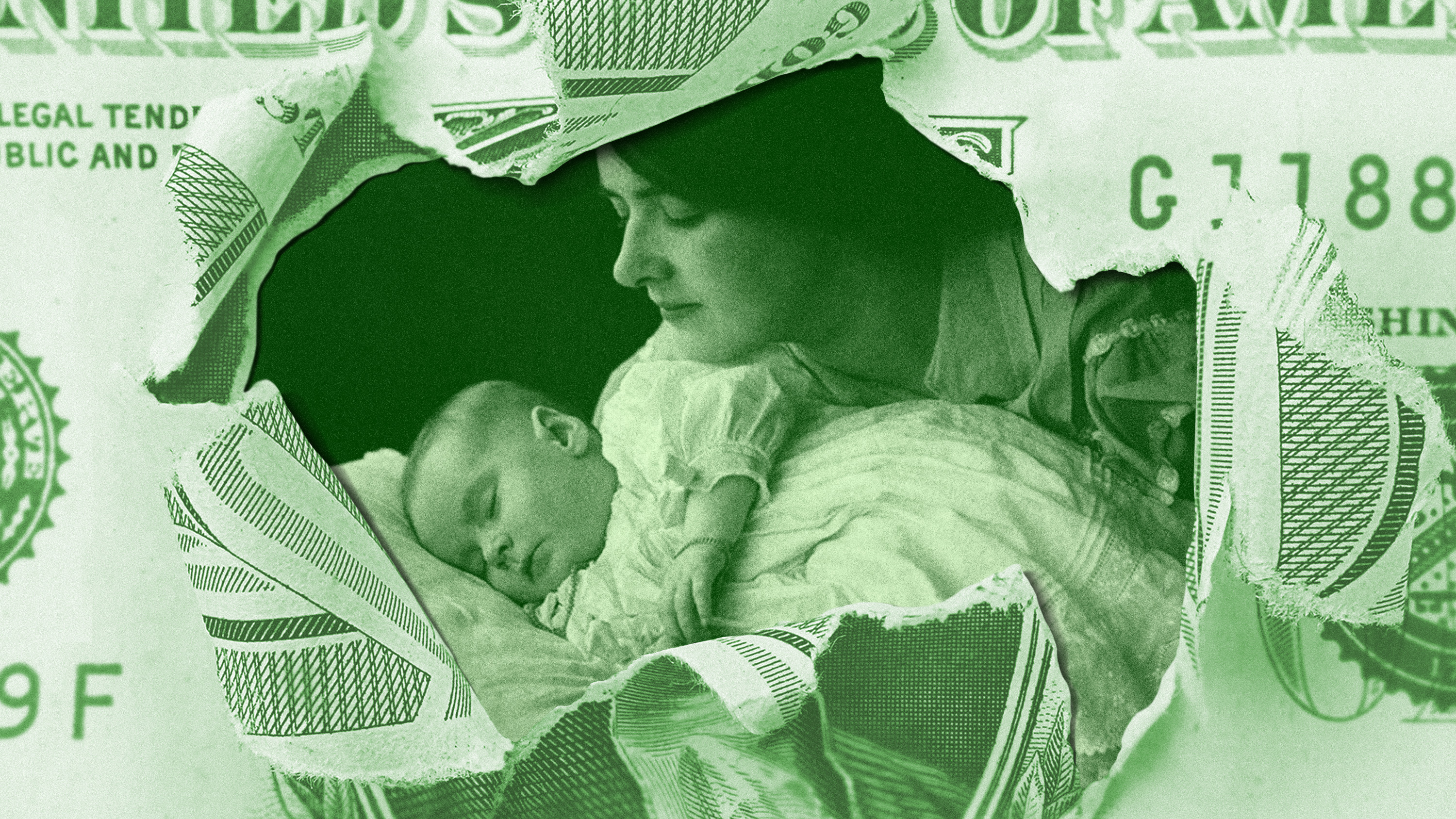
Devaluing Mothers and Children
It’s an observation that a great many thinkers, Christian and otherwise, have echoed: To measure the moral health of a society, look at how it treats its weakest and most vulnerable members. As a close corollary: Look at how it treats those whose value can’t be summed up in snapshots of economic productivity.
Nadya Williams, a scholar who left the professoriate to homeschool her children, worries that contemporary society devalues the work of raising young kids because we use the wrong scorecards to assess its worth. In this, she argues, there are troubling parallels with ancient cultures, which failed to recognize the image of God in all people.
Williams explores these parallels in her book Mothers, Children, and the Body Politic: Ancient Christianity and the Recovery of Human Dignity. CT editor Kate Lucky, herself a young mother, reviewed the book.
“[D]isdain for mothers and children, Williams demonstrates, was … characteristic of antiquity,” writes Lucky. “Drawing on myths, literature, and histories from Greek and Roman writers, she describes a past in which women were sexually exploited, infants were left ‘exposed’ on ‘village dung heaps,’ and anyone who couldn’t achieve military victory on the battlefield was a second-class citizen by default.
“It’s Christianity, she argues, that changed all of this—that gave us the human rights we take for granted, that blessed the meek and lowly instead of kowtowing to the powerful. ‘It is because of two millennia of Christian valuing of human life,’ she states forcefully, that ‘we do not delight in the suffering of the weak.’ Both the life of Christ and the writings of the church fathers demonstrate that ‘the church is responsible for caring for the bodies and souls of the neglected and the abandoned at all ages and life stages, because their lives are priceless.’
“It’s a compelling argument, albeit a familiar one. What’s novel here are Williams’s through lines between the past and the present, some so bold they seem drawn in thick marker. Just as ‘the practice of exposure of infants’ emphasized a ‘utilitarian commodification of infants and children as things,’ she argues, so today ‘we see … the common practice of aborting children with Down syndrome.’ Back then, the spoils were concubines and slaves. Now, they’re stock options. But in both systems, the people who matter are the ones out winning—not the baby with the viral infection, not the mother with sweet potato in her hair. Do we really, Williams asks, want to return to that brutal pre-Christian era?
“Some of Williams’s assertions—that sending kids to school is a ‘severing of bonds’ echoing the child’s separation from the mother’s womb, for instance—will be ‘agree to disagree’ for many readers. (She acknowledges this.) Some of her evidence for cultural phenomena—the posters in her ob-gyn office, a new housewives show that she hasn’t watched—is thin, even if she understands the phenomena correctly.
“But even readers who disagree with Williams’s strong stances on surrogacy, contraception, or working mothers will appreciate the connections she makes, which are compelling, creative, and challenging. And the basic point stands: People matter because they’re made in the image of God. When we forget that, a lot goes awry.”
A Baseball Legend’s Spiritual Crisis
Branch Rickey, who entered the baseball Hall of Fame on the strength of his front office prowess for multiple professional ball clubs, is best known for an act that transcended the playing field: signing Jackie Robinson, the first Black player to grace a Major League roster.
While many baseball fans know Rickey by virtue of this defining achievement, fewer know how Christian faith shaped his career within the sport and his life outside of it. Paul Putz, a historian specializing in the relationship between sports and faith, takes up this topic, among many others, in The Spirit of the Game: American Christianity and Big-Time Sports.
In a recent excerpt for CT, Putz describes a spiritual crisis Rickey faced several years after Robinson broke baseball’s color barrier. After meeting with a Methodist bishop who appeared to dismiss certain core Christian beliefs, Rickey found his convictions severely shaken. But the ordeal had a happy ending, in that it prepared the ground for his influential backing of the Fellowship of Christian Athletes.
“Rickey was not a stickler for theological specifics,” writes Putz, “but for him Christian faith could only have practical meaning for an individual if it was grounded in core Christian doctrines about the deity of Christ and the reliability of the Bible. Rickey could not wholeheartedly follow a bishop who seemed to reject those beliefs.
“In Rickey’s mind, more than his own Methodist faith was at stake—the future of the country depended on the continuation of personal Christian commitment. Theology and politics were intertwined. Bishop Wicke’s liberal theology and intellectualism could undermine America’s spiritual foundation and lead to communism.
“Rickey’s shaken faith made him eager to connect with Christians who shared his approach to religion. In a letter to a friend a few months later, Rickey recounted it all: the lunch with Bishop Wicke, the letter he wrote but never sent, the distrust he felt for denominational leaders. ‘If I were “testifying” in an old-time Methodist class meeting,’ he reported, ‘I would close my remarks surely,—“pray for me, my Christian friends, pray for me,”—and I would really mean it.’
“Don McClanen knew nothing about this in April 1954 when he announced his [Fellowship of Christian Athletes] idea with a letter sent out to 20 prominent Christian athletes and coaches across America, including Rickey. The goal, McClanen explained in the letter, was to ‘provide an opportunity’ for athletes and coaches ‘to speak and witness for Christ and the wholesome principles of good character and clean living to the youth of our nation.’”

Support InterVarsity as they equip young people to navigate political and social divisions with love, wisdom, and grace. Learn more about fostering unity across differences. In an era when societal…
don’t miss
Last week, our household came down with hand-foot-and-mouth disease. Quarantined during an unseasonable heat wave, I sweated through a fever while dabbing ointment on the baby’s weeping blisters. This was…
On a summer night in 1956 at a camp center in the mountains near Estes Park, Colorado, Branch Rickey took the podium. His task: to deliver an address to the…
Thoughtful journalism for complex times.
in the magazine

Our September/October issue explores themes in spiritual formation and uncovers what’s really discipling us. Bonnie Kristian argues that the biblical vision for the institutions that form us is renewal, not replacement—even when they fail us. Mike Cosper examines what fuels political fervor around Donald Trump and assesses the ways people have understood and misunderstood the movement. Harvest Prude reports on how partisan distrust has turned the electoral process into a minefield and how those on the frontlines—election officials and volunteers—are motivated by their faith as they work. Read about Christian renewal in intellectual spaces and the “yearners”—those who find themselves in the borderlands between faith and disbelief. And find out how God is moving among his kingdom in Europe, as well as what our advice columnists say about budget-conscious fellowship meals, a kid in Sunday school who hits, and a dating app dilemma.
more from christianity today
related newsletters
CHRISTIANITY TODAY WEEKLY: CTWeekly delivers the best content from ChristianityToday.com to your inbox each week.
CT PASTORS: Each weekly CT Pastors issue equips you with the best wisdom and practical tools for church ministry.
CT books
Each issue contains up-to-date, insightful information about today’s culture, plus analysis of books important to the evangelical thinker.
Delivered free via email to subscribers weekly. Sign up for this newsletter.
You are currently subscribed as no email found. Sign up to more newsletters like this. Manage your email preferences or unsubscribe.
Christianity Today is a 501(c)(3) nonprofit organization.
“Christianity Today” and “CT” are the registered trademarks of Christianity Today International.
Copyright ©2024 Christianity Today, PO Box 788, Wheaton, IL 60187-0788
All rights reserved.




